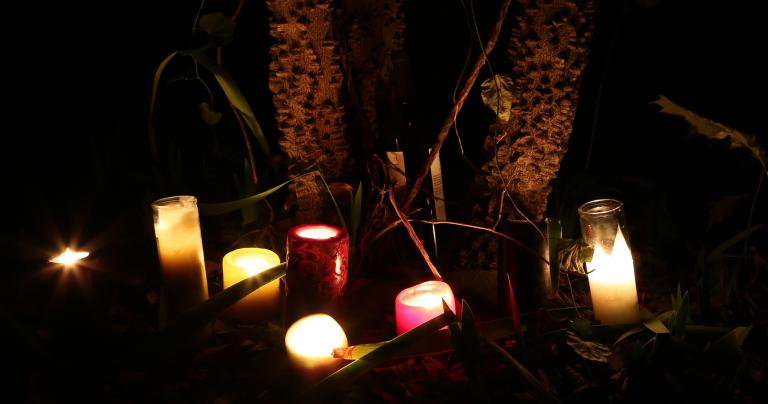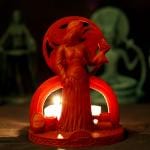Last Sunday’s post Sometimes The Gods Take What They Want and Sometimes What They Want Is You generated a lot of conversation. The post was widely shared and much of the conversation wasn’t on my pages, so I haven’t seen all of it. But what I did see raised good questions, and I want to address some of them here.
In some cases I’m combining multiple comments and in other cases I’m editing for clarity – none of these are copied verbatim. If one of these ideas is yours and you think I missed your point, please elaborate in the comments and I’ll do my best to address it.
1. The Gods aren’t always virtuous
Several people made this comment. The stories of our ancestors say Gods occasionally do bad things, therefore Gods aren’t always virtuous.
This view places too much value on a literal reading of ancient texts. That’s a mistake when Christian fundamentalists do it, and it’s a mistake when Pagans do it. The stories of our ancestors are of great value and there is much they can teach us about the Gods, but reading them literally is an error.
The Gods are divine because they are virtuous, not simply because they are very powerful beings. If They aren’t always virtuous then we’re dealing with the spiritual equivalent of Donald Trump or Bill Gates or Queen Elizabeth – powerful people who might be worth forming alliances with for utilitarian reasons, but no one who is worthy of worship.
That still leaves us with the paradox described in last Sunday’s post, and I still have no resolution for it. But I think it’s better to live with that paradox than to reject the inherent virtue of the Gods.
2. Divine virtue isn’t the same as human virtue
Another variation on this idea said that virtues are culture-specific. I’m not fond of either position.
Virtues are actions, behaviors, and character traits that are inherently good. Some are elemental (truth, courage, kindness) while others are more complex (hospitality, reciprocity). We know that virtues are good because over time they have been shown to be helpful and not harmful. But virtues are inherently good – they are not good simply because a God declares them to be good.
Sometimes virtues are in conflict, as anyone who’s ever tried to be both honest and kind at the same time knows all too well. How we weight and prioritize the many virtues is a question of values, and values are culture-specific. And deity-specific.
So while I don’t agree that the Gods have different virtues from humans, I do think They have a very different perspective from us. That different perspective leads Them to different values, and so They make different choices than we would… sometimes choices that puzzle us.
As someone who worships several Gods, I tend to trust Their perspective, even though often I can’t understand it.
You, of course, must make your own decisions, according to your values.
3. Deities who use force aren’t worth having a relationship with
My problem with this is that it elevates the autonomy of individual humans to the greatest good, ignoring the possibility that because of Their superior perspective, a God may have a good and virtuous reason for coercing a human into Their service.
However, I would say that certain deities are better suited for relationships with certain humans than others. I have actively avoided relationships with trickster deities – I like order far too much. I’ve said “no” on several occasions, and at least for now that answer is holding.
But I know some people who are dedicated to Loki or to Eris and they’re satisfied with their arrangements. Conversely, while I happily serve the Morrigan, I know more than a few people who avoid Her as best they can. Some are more successful at avoidance than others – there’s a reason I used Her statue for the featured image on the claiming post.
Many Gods, many people, many different kinds of relationships.
4. Maybe that wasn’t a God trying to claim you
I’m in agreement with this one. The Gods are always virtuous, but other spirits can and will lie. The Fair Folk either can’t or won’t, but they’re masters of doublespeak. Just because a person is a spirit doesn’t mean they’re a God and it certainly doesn’t mean they’re telling the truth about who and what they are.
Our spiritual experiences are unquestionably real. The challenge is figuring out what they mean. That requires a process of discernment. It requires context, knowledge, observation, analysis, and synthesis. If we skip the discernment process and jump from “big ecstatic experience” straight to “that must have been a God – I should worship them” we may end up serving someone who is unvirtuous and unworthy of our devotion.
Do the work of figuring out Who – or who – you’re dealing with, then respond accordingly.
5. The Gods are forcing you to grow despite your reluctance
No. Just no.
This is another variation on “everything happens for a reason” or “the Universe wants the best for me.” It’s wishful thinking grounded in monotheistic assumptions.
The Gods are Gods. While They sometimes take an interest in individual humans and at times can be nurturing and protective, They are not helicopter parents or life coaches. If They’re pushing you to grow, it is so you can be of service at some point in the future. Leave the “your best life now” crap to the pseudo-Christian televangelists and the New Age hucksters.
6. What you’re experiencing is a psychological phenomenon
I saved this one for last because it’s the most disturbing of them all.
This argument is an arrogant dismissal of someone else’s most intimate – and for some, most traumatic – experiences.
As Chiron Armand said “skepticism is a privilege not all of us have.”
Let’s get the mental health issues out of the way. Yes, thinking you hear voices (in any sense of the term) is a classic symptom of mental illness. But it’s one symptom out of many, not a straightforward “if A then B” diagnosis. Are you a trained psychologist? Did you do a thorough examination of the patient? Are you familiar with the patient’s religion and culture? Then you shouldn’t be practicing psychology on the internet.
I know people who have mental illnesses and also have experiences of the Gods. Keeping the two separate is a tremendous challenge and they don’t need some uninformed skeptic muddying the waters for them.
People have had experiences of Gods for at least as long as we’ve been human. Those experiences have been interpreted in the context of an inspirited world, where relationships with Gods, ancestors, and other spiritual beings is a good, helpful, and ordinary thing.
Then Christianity, in its attempt to claim that it alone is the One True Way, said that any experiences outside its narrowly prescribed framework are “of the devil.” And then atheism, in its attempt to claim that it alone is the One True Way, said that any experiences outside its narrowly prescribed framework are “delusions.”
What arrogance. What condescension. What cruelty.
If you want to argue against the existence of Gods and spirits, do it in an environment set up for such a debate. Do not inject yourself into an intimate conversation about experiences you don’t understand.
Some ecstatic experiences are warm, inclusive, and affirming. But others are painful, challenging, and terrifying. Being claimed by a God almost always falls into the second category.
And it’s not just trying to process the initial experience. It’s also trying to follow your orders, complete your mission, and accomplish things that other see as strange and scary. That doesn’t end in a week or a month or a year. Being claimed by a God is usually a “for life” thing. It requires sacrifices – and not just libations. What you gain can be amazing, but what you lose is tangible.
And those who were claimed didn’t get to choose for themselves.
Skepticism is a privilege not all of us have.
If someone tells you they were claimed by a God, they’ve trusted you with an intimate part of their lives. Honor that trust with dignity and respect.

















